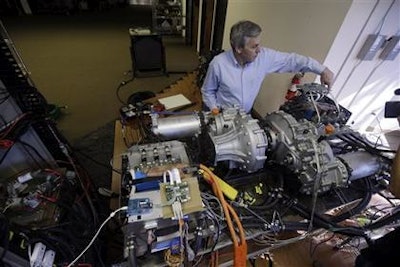
San Jose, California — Twelve years ago, Ian Wright and some fellow engineers launched Tesla Motors, a Silicon Valley company that has helped jumpstart the market for electric cars.
Now, the Tesla co-founder wants to electrify noisy, gas-guzzling trucks that deliver packages, haul garbage and make frequent stops on city streets.
His latest venture, Wrightspeed, doesn't make the whole truck. Rather it sells electric powertrains that can be installed on medium-and heavy-duty commercial vehicles, making them cleaner, quieter and more energy-efficient.
"We save a lot on fuel. We save a lot on maintenance, and we make the emissions compliance much easier," said Wright, a New Zealand-born engineer who left Tesla when it was still a small startup in 2005.
Wrightspeed is one of a growing number of companies that are trying to transform the market for commercial trucks that consume billions of gallons of fuel while spewing tons of carbon dioxide, nitrogen oxide and other pollutants.
While more consumers are switching to electric cars like the Nissan Leaf, Chevy Volt or Tesla Model S, convincing commercial fleet owners to replace their diesel trucks won't be easy.
"It takes a lot of technological ambition to break into such an old and established market," said Mark Duvall, a research director at the Electric Power Research Institute in Palo Alto. "If you want to sell a fleet owner an electric truck, you have to convince them that it's better than what they're already using. So the bar is set very high."
Wright's company is installing its powertrains on 25 FedEx delivery trucks and 17 garbage trucks for the Ratto Group, a Santa Rosa-based waste management company. Its plug-in powertrains feature an electric engine, battery system and on-board power generator that runs on diesel or natural gas and recharges the battery when it gets low.
It costs $150,000 to $200,000 to install a Wrightspeed motortrain, while it costs, for example, about $500,000 for a new garbage truck.
The San Jose-based company is generating interest from trucking fleet owners who are scrambling to meet California's increasingly strict emissions standards but don't want to replace the entire vehicle, Wright said.
"You can take this truck that you've invested all this money in and it's still in good shape, and you can swap out the powertrain for our powertrain and suddenly you're emissions-compliant," Wright said.
To meet growing demand, Wrightspeed is preparing to move into a former aircraft hangar at the decommissioned U.S. Naval Air Station in Alameda. The company plans to expand its workforce from roughly 25 to 250 employees over the next three years, Wright said.
The Ratto Group, which collects garbage and recycling in Marin and Sonoma counties, is giving Wrightspeed a chance, retrofitting some of its garbage trucks. It could convert many more of its 300 vehicles if the technology performs as hoped.
"My hope is that this is something we can prove together with Wrightspeed and that we can be on the cutting edge of this, and I can transform my fleet and hopefully transform my industry," said Lou Ratto, the company's chief operating officer.
When Wright left Tesla to start Wrightspeed, he planned to make high-performance electric sports cars, but he struggled to raise money from investors because the market wasn't big enough.
So Wright switched gears and set his sights on the roughly 2.2 million commercial trucks in the U.S. that burn roughly 20 times more fuel than a passenger car and are a major source of air pollution and greenhouse gas emissions.
Wrightspeed has raised Silicon Valley venture capital and secured grants from the California Energy Commission, which funds alternative fuel technologies that could help the state's dependence on fossil fuels. Gov. Jerry Brown wants to cut petroleum use in cars and trucks by 50 percent by 2030.
A truck with a Wrightspeed powertrain can run on batteries for about 30 miles before the turbine, which runs on diesel or natural gas, kicks in and recharges the battery. The system roughly doubles the fuel efficiency of trucks and reduces the cost of maintenance, Wright said.
While trucks aren't as sleek as Tesla's sports cars, a popular vehicle among Silicon Valley elites, Wright believes his powertrains can do more to reduce carbon pollution because trucks are such heavy polluters.
"I think what they've done is absolutely fantastic, but what we're doing is the next thing," Wright said. "It's even better."





















